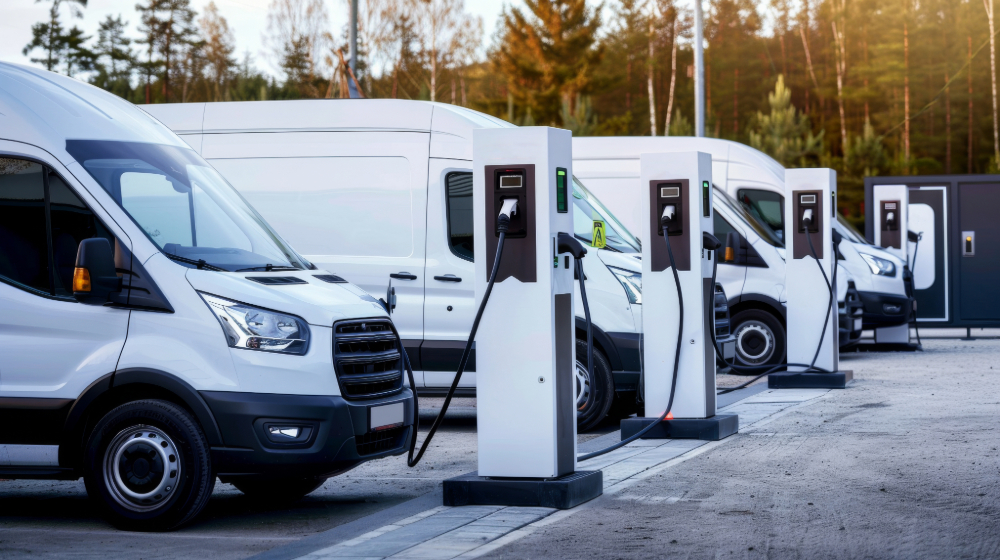
Builders’ merchant, Travis Perkins explores why tradespeople should be making the switch to an electric van
There are now more than 78,000 electric vans registered in the UK as of the end of February 2025, according to statistics by leading UK eMobility service provider Zapmap.
While this currently only represents around 1.6 per cent of all light commercial vehicles being driven across the nation, the market is certainly growing. This is because there were less than 5,300 electric vans on UK roads as 2020 ended.
Some tradespeople may have been slightly put off investing in an electric van recently upon hearing that registered keepers of these vehicles will need to pay vehicle tax in the same way that those with petrol or diesel vans need to as of April 1st 2025.
However, builder’s merchant and wooden fence posts supplier Travis Perkins has detailed the many appealing reasons for those in the trade to improve their fleet with some electric vans…
Advantages of Getting an Electric Van
Here are three key reasons why tradespeople will never look back once they have bought an electric van:
You can bring your van’s running costs down
As researched by Admiral, it is a lot more cheaper to run an electric van than it is an alternative vehicle that uses traditional fuel.
The insurance company reported that it will typically cost close to £20 to give a Vauxhall Vivaro Electric van that has a 75kWh battery a full charge. If this vehicle covers 40,000 miles on an annual basis, you would be looking at around £3,900 to keep the van running.
To achieve the same mileage in the diesel variant of this van model, Admiral found at the time of its research in 2024 that you would need to spend an estimated £6,900 on fuel.
On this topic, it should also be pointed out that electricity prices fluctuate a lot less than petrol prices. So, tradespeople should get less of a surprise about how much it is costing to keep their van on the road from one month to the next.
You can enter LEZs free of charge
Low Emission Zones (LEZ) and Clean Air Zones (CAZ) are becoming more popular throughout the UK, as local authorities aim to improve air quality in the areas that they serve. Cities which have one of these schemes active already include London, Edinburgh, Birmingham, Glasgow, Newcastle and Aberdeen.
There are more CAZs and LEZs under consultation too, so it is only going to become more beneficial to have a vehicle that does not produce too many emissions to avoid building up expensive charges.
Fortunately, electric vans do not produce any carbon dioxide or nitrogen emissions. So, tradespeople will be able to enter CAZs and LEZs for jobs without needing to pay a charge for the journey.
You can enjoy a more pleasant driving experience
Tradespeople who get behind the wheel of an electric van for the first time will find the drive to be more relaxing than what they have witnessed in petrol or diesel alternatives.
Electric vehicles run very quietly for one thing, which is pleasant for the driver and any passengers. Electric motors deliver a van with instant torque too, meaning that accelerating is a smooth and quick experience.
Those in the trade who do most of their work in urban settings will also be pleased to hear that electric vans are designed with a single-speed gearbox. This means that driving these vehicles will involve no gear changes, using a gear lever or pushing on a clutch – all of which can get tiring when stop-start driving through a town or city in the majority of diesel and petrol vans setup with a manual gearbox.
Schemes Available to Help Tradespeople Get an Electric Van
It must be mentioned though that an electric van is usually still priced higher than petrol and diesel alternatives. Fortunately, there are some incentive schemes from the government still in place to make purchasing an electric vehicle more affordable.
The Plug-in Van and Truck Grant, for instance, can see tradespeople saving up to 20 per cent on the cost of an electric van. This is up to a maximum of £8,000, with the scheme also presenting those who successfully apply the opportunity to receive reduced tax burdens when they drive their vehicle for business or private use.
People who have already bought an electric van and own a flat or rent their property could also receive 75 per cent off the purchase and installation of a chargepoint socket with an electric vehicle chargepoint grant.
Whether a grant is received to fit an electric vehicle charger at a property or not, it is recommended that this equipment is only installed where off-road parking is possible – in a garage or on a driveway, for example. Running a cable across a public street can create a trip hazard, even if a cable cover is being used, and result in local authorities intervening to remove this issue.
Disadvantages of Getting an Electric Van (& Efforts Being Made to Improve These)
There are still some elements of electric vans which are putting people off investing in them, but vehicle manufacturers and other organisations are looking to make these less of an issue.
Range is one topic that is regularly discussed when it comes to electric vans, as many people are still worried about how far they can travel on a single charge. Advancements keep on being made with battery technology though, which allow these vehicles to go further between charging periods.
To further ease concerns around this matter, the UK’s charging points network has grown significantly in recent years. As again reported by Zapmap, the number of public charging points in place across the nation has increased from 28,460 at the end of 2021 to 75,675 as of February 2025.
Another disadvantage of owning an electric van is that the battery’s weight means that the vehicle usually weighs a little bit more than the same model that runs on petrol or diesel. The maximum payload of an electric van is often less than the petrol or diesel variant because of this.
However, the latest electric vans to hit the market have been designed so that the vehicle’s batteries sit below the floor. What this means is that the maximum load volume, which is the space found inside the van, remains the same whether an electric, petrol or diesel variant is selected.
The UK’s electric van market continues to grow in popularity, as the technology in the vehicles become more advanced and the nation’s charging network strengthens. Tradespeople are encouraged to join the thousands of registered UK electric van owners to bring their costs down as they travel from one job to the next.
For further information on Travis Perkins click here







